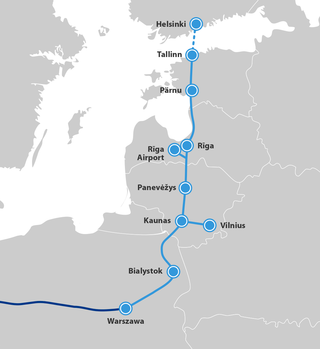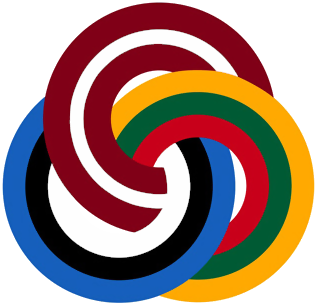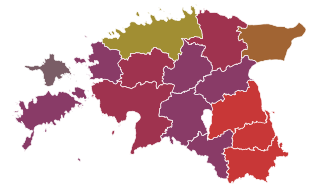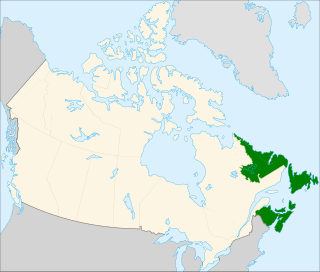Related Research Articles

Latvia, officially the Republic of Latvia, is a country in the Baltic region of Northern Europe. It is one of the three Baltic states, along with Estonia to the north and Lithuania to the south. It borders Russia to the east and Belarus to the southeast, and shares a maritime border with Sweden to the west. Latvia covers an area of 64,589 km2 (24,938 sq mi), with a population of 1.9 million. The country has a temperate seasonal climate. Its capital and largest city is Riga. Latvians belong to the ethnolinguistic group of the Balts and speak Latvian. Russians are the most prominent minority in the country, at almost a quarter of the population; 37.7% of the population speak Russian as their native tongue.

The Baltic states or the Baltic countries is a geopolitical term encompassing Estonia, Latvia, and Lithuania. All three countries are members of NATO, the European Union, the Eurozone, Council of Europe, and the OECD. The three sovereign states on the eastern coast of the Baltic Sea are sometimes referred to as the "Baltic nations", less often and in historical circumstances also as the "Baltic republics", the "Baltic lands", or simply the Baltics.

The Singing Revolution was a series of events from 1987 to 1991 that led to the restoration of independence of the three Soviet-occupied Baltic countries of Estonia, Latvia, and Lithuania at the end of the Cold War. The term was coined by an Estonian activist and artist, Heinz Valk, in an article published a week after the 10–11 June 1988 spontaneous mass evening singing demonstrations at the Tallinn Song Festival Grounds.

The Baltic Cup is an international football competition contested by the national teams of the Baltic states – Estonia, Latvia and Lithuania. Sometimes guests from the Northern Europe subregion are also invited: Finland has participated in the event twice, Iceland once, and Faroe Islands made a debut appearance in 2024. Though originally held annually, the competition has been biennial since 2008.

Arturs Krišjānis Kariņš is an American-Latvian politician who served as the prime minister of Latvia from 2019 until 2023. A linguist and businessman by profession, he previously served as Latvia's minister of Economics and a Member of the European Parliament. Born in Wilmington, Delaware, United States, to parents who had left Latvia during the Soviet occupation, he was active in the American Latvian community throughout his youth.
The June deportation of 1941 was a mass deportation of tens of thousands of people during World War II from Estonia, Latvia, Lithuania, present-day western Belarus and western Ukraine, and present-day Moldova – territories which had been occupied by the Soviet Union in 1939–1940 – into the interior of the Soviet Union.

Rail Baltica is an under-construction rail infrastructure project that is intended to integrate the Baltic states in the European rail network. Its purpose is to provide passenger and freight service between participating countries and improve rail connections between Central and Northern Europe, specifically the area southeast of the Baltic Sea. It is also intended as a catalyst for building the economic corridor in Northeastern Europe. The project envisages a continuous rail link from Tallinn (Estonia) to Warsaw (Poland), consisting of links via Riga (Latvia), Kaunas, and Vilnius (Lithuania). Its total length in the Baltic States is 870 kilometres (540 mi), with 213 kilometres (132 mi) in Estonia, 265 kilometres (165 mi) in Latvia, and 392 kilometres (244 mi) in Lithuania. Rail Baltica is one of the priority projects of the European Union (EU). It is part of the North Sea–Baltic Corridor of the Trans-European Transport Networks (TEN-T).

Baltic Pride is an annual LGBT+ pride parade rotating in turn between the capitals of the Baltic states; Tallinn, Riga and Vilnius. It is held in support of raising issues of tolerance and the rights of the LGBT community and is supported by ILGA-Europe. Since 2009, the main organisers have been Mozaīka, the National LGBT Rights Organization LGL Lithuanian Gay League, and the Estonian LGBT Association.
The Sovietization of the Baltic states is the sovietization of all spheres of life in Estonia, Latvia and Lithuania when they were under control of the Soviet Union. The first period deals with the occupation from June 1940 to July 1941, followed by the German occupation during World War II. The second period of occupation covers 1944 when the Soviet forces pushed the Germans out, until the end of the Soviet occupation in 1991 when the three countries restored full independence.
A travel ban is one of a variety of mobility restrictions imposed by governments. Bans can be universal or selective. The restrictions can be geographic, imposed by either the originating or destination jurisdiction. They can also be based on individual status, such as health or vaccination, or as driving bans during extreme weather events. During the COVID-19 pandemic, governments banned entry by residents of some or all other countries.

The Baltic Futsal League is a futsal club commercial competition involving 8 teams from Estonia, Latvia, Lithuania, Russia, and Belarus.

The global COVID-19 pandemic arrived in Europe with its first confirmed case in Bordeaux, France, on 24 January 2020, and subsequently spread widely across the continent. By 17 March 2020, every country in Europe had confirmed a case, and all have reported at least one death, with the exception of Vatican City.

During the COVID-19 pandemic, many countries and territories imposed quarantines, entry bans, or other travel restrictions for citizens of or recent travelers to the most affected areas. Some countries and territories imposed global restrictions that apply to all foreign countries and territories, or prevented their own citizens from travelling overseas.

The COVID-19 pandemic in Estonia was a part of the worldwide pandemic of coronavirus disease 2019 caused by severe acute respiratory syndrome coronavirus 2.
The COVID-19 pandemic in Latvia was a part of the worldwide pandemic of coronavirus disease 2019 caused by severe acute respiratory syndrome coronavirus 2. The virus was confirmed to have reached Latvia on 2 March 2020, having been brought along with people returning from abroad.
The 2020 Baltic Cup was the 28th Baltic Cup, an international football tournament contested by the Baltic states. Originally scheduled to be held in the summer 2020, the tournament was postponed due to the COVID-19 pandemic and rescheduled for 1 to 10 June 2021, while retaining the name 2020 Baltic Cup. Estonia won their fourth title, and their first since 1938.

The Atlantic Bubble was a special travel-restricted area created on July 3, 2020, during the COVID-19 pandemic in Canada. The area was an agreement between the four Atlantic Canadian provinces of New Brunswick, Prince Edward Island, Nova Scotia, and Newfoundland and Labrador which allowed unrestricted travel among provincial residents and restricted travel from Canadians who were residents of outside provinces. Residents wishing to travel to the Atlantic Bubble were subjected to screening and were required to quarantine for 14 days before moving freely throughout the bubble. Individual provinces had specific rules toward travellers from outside of Atlantic Canada. The provinces in the bubble saw the lowest numbers of COVID-19 compared to other Canadian provinces throughout the pandemic.

The Baltic Hockey League is a professional ice hockey competition based in the Baltic states featuring club teams from Estonia, Latvia and Lithuania. The competition was founded in 2018, and the first edition of the competition began in November, 2020.
Events in the year 2022 in Latvia.
References
- 1 2 Mzezewa, Tariro (2020-04-29). "3 Baltic States Announced a 'Travel Bubble.' What Is It and Could It Work in the U.S.?". The New York Times . ISSN 0362-4331. Archived from the original on 2021-03-08. Retrieved 2021-03-24.
- ↑ "Coronavirus: Baltic states open a pandemic 'travel bubble'". BBC News . 2020-05-15. Archived from the original on 2021-01-25. Retrieved 2021-03-24.
- 1 2 3 "Latvia bursts Baltic travel bubble as COVID19 cases surge". AP News . 2020-09-11. Archived from the original on 2020-12-30. Retrieved 2021-03-24.
- ↑ "Estonia Plans to Restore 'Baltic Bubble' Travel Zone". Schengen Visa Info News. 2021-04-29. Retrieved 2021-06-11.
- ↑ "Lithuanian PM doubts the need for Baltic 'travel bubble'". LRT English . 2021-04-29. Retrieved 2021-06-12.
- ↑ "Baltics planning to revive 'travel bubble'". Eesti Rahvusringhääling (ERR). 2021-05-28. Retrieved 2021-06-12.